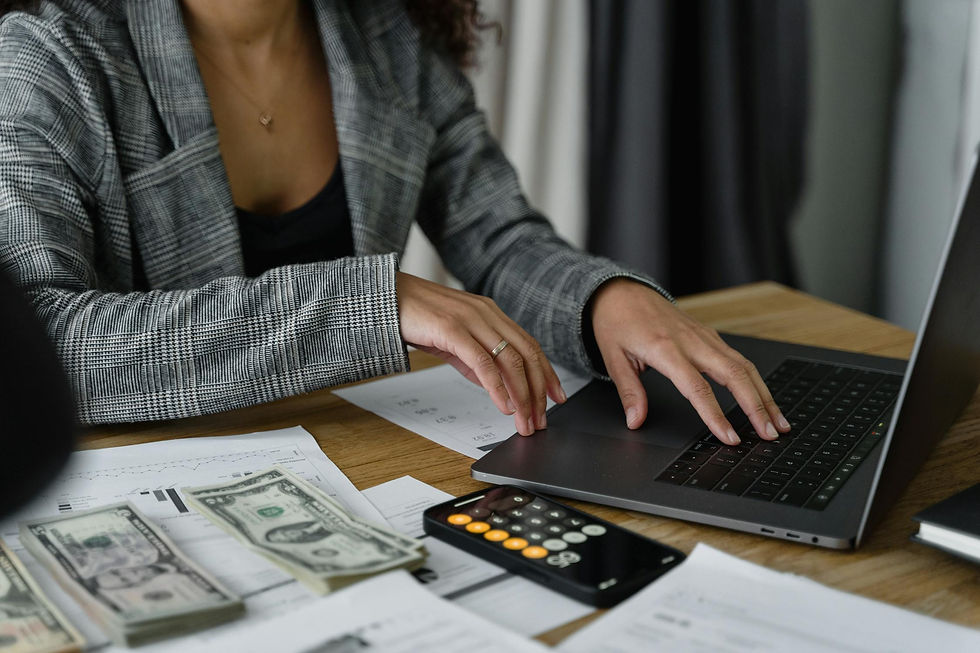Unlocking Your Future: Top Free Financial Literacy Resources for Women, Teens, and Students
- Rebecca Ryan
- Oct 12, 2024
- 4 min read
Updated: Oct 24, 2024
In an increasingly complex financial landscape, understanding money management has become a vital skill. For women, teens, and students stepping into adulthood, financial literacy is more than just a set of skills; it’s the key to independence, confidence, and long-term success. Thankfully, numerous free financial literacy resources are available to help you take charge of your financial future. At Lets Talk Business, we believe that everyone deserves access to financial education, and we’re here to guide you through some of the best options out there.
Why Financial Literacy Matters
Before diving into the resources, let’s briefly explore why financial literacy is essential, especially for young women and students:
Confidence in Decision-Making: Understanding finances helps you make informed decisions about budgeting, saving, and investing, which can boost your confidence in handling financial matters.
Empowerment: Knowledge is power. By learning about finances, you equip yourself with the skills necessary to navigate complex financial situations, whether it’s managing student loans or negotiating salaries.
Breaking the Cycle: Financial literacy can help break the cycle of poverty and financial insecurity. The more educated you are about finances, the better choices you’ll make for your future.
Top Free Financial Literacy Resources
Now, let’s explore some of the best free financial literacy resources available. These resources cater to different learning styles and preferences, ensuring there’s something for everyone.
1. Khan Academy
Khan Academy offers a comprehensive suite of free online courses on various topics, including personal finance. Their financial literacy section covers essential topics such as budgeting, saving, credit, and investing. The platform’s engaging videos and interactive quizzes make learning enjoyable and effective.
Why it’s great: User-friendly interface and a wealth of information, all available at your own pace.
2. National Endowment for Financial Education (NEFE)
NEFE provides a treasure trove of free educational resources aimed at high school students and young adults. Their “Smart About Money” program includes a variety of tools, including budget calculators, quizzes, and worksheets.
Why it’s great: Focused specifically on the needs of students, making it relatable and easy to understand.
3. MyMoney.gov
Operated by the U.S. government, MyMoney.gov is a fantastic resource for anyone looking to improve their financial literacy. The site offers tools, tips, and resources tailored for different life stages. You can find information on budgeting, saving for retirement, and understanding credit scores.
Why it’s great: A reputable government source that provides unbiased, straightforward information.
4. Smart About Money
This platform offers a variety of free courses and tools aimed at helping individuals achieve their financial goals. You can find courses on budgeting, debt management, and investing, as well as personalized action plans.
Why it’s great: Offers a holistic approach to financial literacy, making it suitable for various needs.
5. YouTube Channels
YouTube is an invaluable resource for free financial literacy content. Channels like "The Financial Diet," "Graham Stephan," and "Frugal Chic Life" provide entertaining and informative videos on budgeting, saving, investing, and achieving financial independence.
Why it’s great: Visual and engaging content that allows you to learn while being
entertained.
6. Local Libraries
Don’t overlook your local library! Many libraries offer free workshops, financial literacy programs, and access to books and online courses about personal finance. Check with your library to see what resources they have available.
Why it’s great: Community-oriented and often tailored to local needs, fostering a sense of connection and support.
7. Apps for Financial Literacy
Several apps offer free features to help you manage your finances. Apps like Mint and YNAB (You Need A Budget) provide budgeting tools, spending tracking, and financial goal setting. While YNAB offers a subscription service, its free trial is an excellent way to get started.
Why it’s great: Hands-on tools that can help you apply what you’ve learned in real life.
How to Use These Resources Effectively
While these free financial literacy resources are invaluable, knowing how to use them effectively is crucial. Here are some tips:
Set Clear Goals: Determine what aspects of financial literacy you want to learn about first, whether it’s budgeting, saving, or investing.
Create a Study Schedule: Treat your financial education like any other important class. Set aside regular time to explore these resources and absorb the information.
Engage with Others: Join forums or community groups focused on financial literacy. Engaging with peers can provide support, encouragement, and different perspectives on financial topics.
Take Action: Knowledge is only powerful when applied. Start budgeting, tracking your expenses, and exploring investment options as you learn.
Stay Updated: Financial literacy is an ongoing journey. Continue to seek out new resources and stay informed about changes in financial regulations, tools, and opportunities.
Conclusion: Empower Your Financial Future
The journey to financial literacy doesn’t have to be overwhelming. With a wealth of free financial literacy resources at your fingertips, you can take charge of your financial education and future. Empowering yourself with knowledge is one of the best investments you can make—both for yourself and for the communities you are a part of.




Yorumlar